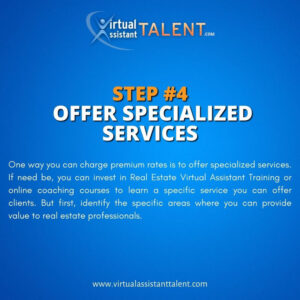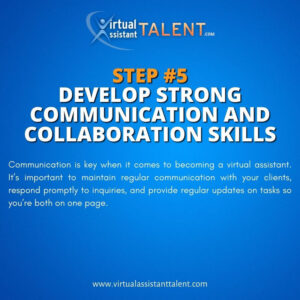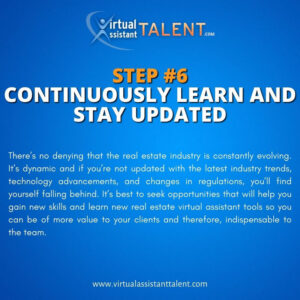
Step 1. Acquire the necessary real estate skills
Step 2. Build a professional portfolio
Step 3. Market yourself and find clients
Step 4. Offer specialized services
Step 5. Develop strong communication and collaboration skills
Step 6. Continuously learn and stay updated
The world of virtual assistance has just gotten bigger. Once only referring to a remote worker providing administrative support to executives or business owners now embraces a wider scope of services.
More and more professionals and small businesses need the services of virtual assistants. Some of these need industry-specific training and skills like a real estate virtual assistant.
What is a real estate virtual assistant?
Real estate virtual assistants or REVAs are virtual assistants that offer a wide range of administrative support and real estate-related services to help you grow your business. There are real estate VAs for agents and brokers, investors, property management firms, and even telemarketers. Their expertise in real estate can help these professionals accomplish many tasks by delegating the repetitive ones to the REVAs.

If you’ve got a background in real estate and would like to venture into the virtual assistant world, you definitely can! You can seek out a real estate virtual assistant agency to help you get started or you can follow these steps to become a real estate VA.
Step 1. Acquire the necessary real estate skills
Being a real estate virtual assistant means you need to have knowledge and skills that would be useful to a real estate professional. Other than that you also need to be familiar with administrative virtual assistant tasks and other virtual assistant responsibilities.

If you didn’t come from a real estate background, you need to know real estate terminology, industry practices, and software used in the field. You need to develop skills in communication, organization, time management, and customer service as well. To summarize, these are the skills that you need to have:
-
Real Estate Knowledge
– Understand property types, transactions, contracts, and local market trends so you can better collaborate and support real estate clients.
-
Administrative Skills
– You need to have strong organizational skills, attention to detail, and the ability to manage multiple tasks. This includes time management, scheduling, file organization, data entry, and maintaining accurate records.
-
Communication – You’ll need excellent communication skills, both written and verbal to effectively communicate and convey information accurately with clients, customers, and other stakeholders.
-
Technology Proficiency – There are certain tools and software specific to real estate that you need to know to make your work easier. This includes customer relationship management (CRM) systems, transaction management platforms, document signing software, and virtual communication tools.
-
Marketing and Social Media – You also need to know a basic knowledge of online marketing real estate principles, social media platforms, and digital marketing strategies to help with the marketing efforts of your client.
-
Research and Analysis – You need to have strong research skills to gather valuable property info and market data in order to conduct competitive analysis.
-
Customer Service – You will also take on the role of a customer service provider so you need to have a customer-centric mindset, be responsive to inquiries, and maintain professionalism and confidentiality while dealing with clients and customers.
-
Problem-Solving – Your client will rely on you to think critically and solve problems efficiently. You need to be resourceful and adaptable to address any issues that may arise.
-
Adaptability – The real estate industry is dynamic, and priorities can change quickly. You need to be adaptable and flexible to accommodate shifting schedules, urgent tasks, or last-minute changes.
-
Professionalism and Ethics – As a VA, you need to maintain a high level of professionalism, integrity, and ethical conduct when handling confidential client information and sensitive matters.
Step 2. Build a professional portfolio
A lot of clients usually ask for a portfolio before hiring the right real estate virtual assistant. Before you feel disqualified because you don’t have one, create a portfolio that showcases your relevant skills and experiences.

You should include details about your education, real estate virtual assistant training, certifications, and any previous real estate or administrative work you have done. You can also highlight specific tasks or projects you have completed successfully.
-
Determine Your Focus
– Since you offer special services as a real estate VA, you should highlight your real estate virtual assistant skills in transaction coordination, listing management, lead generation, marketing support, and database management.
-
Highlight Relevant Experience
– If you have a real estate background, it’s best to showcase the previous projects or tasks that you have handled and the tools or software that you have used.
- Include Testimonials or Recommendations– You can request testimonials or recommendations from your previous clients or employers who can vouch for your skills and work ethic.
-
Showcase Successful Projects
– If you are able to provide some case studies or success stories on how you were able to help real estate professionals achieve their goals, that would be great. Use metrics or quantifiable results whenever possible to showcase the value you bring.
-
Provide Samples of Work
– Most clients ask for samples so be one step ahead of them by including samples of work in your portfolio. This way you can showcase the quality of your work and what you can deliver to the clients.
-
Create a Professional Website or Online Portfolio
– You can create your online portfolio using platforms like WordPress, Wix, or Squarespace. Include an about me page, services offered, testimonials, contact information, and a clear call-to-action for potential clients.
-
Update Your LinkedIn Profile
– Take advantage of LinkedIn as it is a valuable platform for networking and showcasing your professional profile. Connect with real estate professionals, join relevant groups, and engage in industry discussions to expand your network.
Step 3. Market yourself and find clients
Now that you have a nice-looking portfolio, it’s time to market yourself and find clients. Once you have created an online presence with your website or online portfolio, you can make your presence known to potential clients.

Look for virtual assistant directories or freelance platforms and create profiles. You can also utilize social media platforms to network with real estate professionals and join online communities related to real estate and virtual assistance.
Step 4. Offer specialized services
One way you can charge premium rates is to offer specialized services. If need be, you can invest in Real Estate Virtual Assistant Training or online coaching courses to learn a specific service you can offer clients. But first, identify the specific areas where you can provide value to real estate professionals.

The tasks can range from listing management, lead generation, transaction coordination, marketing support, and database management to customer support, client communication, and more. Tailor your services to meet the specific needs of real estate professionals and distinguish yourself from general virtual assistants.
Step 5. Develop strong communication and collaboration skills
Communication is key when it comes to becoming a virtual assistant. It’s important to maintain regular communication with your clients, respond promptly to inquiries, and provide regular updates on tasks so you’re both on one page.

When you are able to understand your client’s preferences and work schedules, and when you adhere to deadlines and become proactive in offering suggestions and solutions, you’ll have a long-lasting working relationship with them. When you show a promising work ethic to your clients, they can recommend you to their friends or colleagues who might need your virtual assistant services as well.
Step 6. Continuously learn and stay updated
There’s no denying that the real estate industry is constantly evolving. It’s dynamic and if you’re not updated with the latest industry trends, technology advancements, and changes in regulations, you’ll find yourself falling behind. It’s best to seek opportunities that will help you gain new skills and learn new real estate virtual assistant tools so you can be of more value to your clients and therefore, indispensable to the team.

You can look for webinars or workshops that you can attend and acquire relevant certifications that can help boost your professional image. Continuously improving your skills will make you a valuable asset to real estate professionals.
If you find it difficult to start on your own, you can always rely on a real estate marketing company to help you. Partner with the best virtual assistant agency and kickstart your real estate VA journey with us!
If you need a real estate virtual assistant, you can find the best REVAs right here! Contact us to schedule a call with our representative.
References:
How to Become a Real Estate Virtual Assistant (+10 Easy Ways to Find Work) (remoteworkcareers.com)
How to Become a Real Estate Virtual Assistant (2023) (mommoneymap.com)

